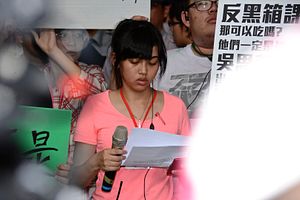Dozens of Taiwanese students briefly occupied the Ministry of Education (MOE) in Taipei last night to protest a series of “minor” adjustments (課綱微調) to school textbooks which activists and academics claim are Sino-centric and whitewash the authoritarian period in Taiwan’s history.
Scaling ladders, the activists slipped by police and stormed the ministry building late on Thursday evening. According to the police, 18 activists subsequently barricaded themselves inside Minister of Education Wu Se-hwa’s office, using furniture to block the door. By about 1 a.m., police had succeeded in expelling the students, some of whom had their hands tied behind their backs with plastic restraints.
In total, 33 persons were arrested, including 24 students—11 of them under the age of 18. Three journalists were also arrested and taken away. Law enforcement said they detained the media personnel to ensure they were not participating in the protest. Reporters at the site complained they were prevented from doing their work. Footage provided by one of the journalists who was taken away (he was released in the afternoon on NT$10,000 bail) shows police using strobe lights to prevent him from taking photographs, while other officers are pulling at him and are heard saying, “No one asked you to come to cover the story.”
All 33 were being questioned by police for “breaching government premises” and “causing damage” to the building. About 200 protesters gathered again outside the MOE on Friday morning to demand that their fellow students be released.
The incident occurred after hundreds of students staged a two-day sit-in outside the MOE, located hundreds of meters away from the Legislative Yuan, which was occupied for 21 days in March and April last year over a controversial services trade pact with China.
The campaign against the “fine tuning” of the textbooks, which began in early 2014, has gained momentum in recent months, with several protests being staged at schools and education offices across Taiwan. Students from as many as 150 schools around Taiwan have called on the MOE to withdraw the proposed changes. Activists, academics, and teachers argue that the “minor” adjustments, which apply mostly to the period after 1949, misrepresent history, gloss over the KMT’s role in the 228 Massacre and the White Terror, and impose a China-centric curriculum. They also claim that the process by which the guidelines were arrived at was conducted without proper oversight and accountability. The ministry has countered that the changes do not constitute “de-Taiwanization,” but rather “de-Japanization” of the curriculum.
Some of the individuals in charge of the revisions are also well known for their pro-China ideology, which has very little resonance among young Taiwanese. One of them is the convener of the task force that formulated the changes, Wang Hsiao-po, a professor of Chinese language and Chinese philosophy professor at Shih Hsin University and vice chairman of the Alliance for the Reunification of China.
Although the MOE had organized a number of meetings in recent months to consult with its critics, several were cancelled and Wu often failed to show up after being repeatedly confronted. The activists argue that they have not been taken seriously, and that the ministry has yet to provide a proper response to their demands. In return, the MOE has said that street protests are not the “best way” to resolve the matter and that both sides should sit down together to “better understand each other.” Critics of the government’s response have pointed out that the government’s attitude towards the young activists is similar to that which led the Sunflower Movement to escalate in 2014.
Hours before launching their raid on the MOE on Thursday, students from the Northern Taiwan Anti-Curriculum Changes Alliance stormed out of a MOE-sponsored forum on the controversy, saying that the responses given them by K-12 Education Administration Director Wu Ching-shan “lacked sincerity” and were a “deliberate waste of time.” Education Minister Wu did not attend the meeting.
The new curriculum is expected to come into force in August.
The heads of a number of municipal governments have said they would refuse to use the revised textbooks unless the proper revisions are made. The National Academy for Educational Research, however, has warned that refusal to use “approved” textbooks would be “in defiance of regulations.” As exams are administered by the central government, some fear that the refusal to use the new textbooks could put students in those municipalities at a disadvantage.

































